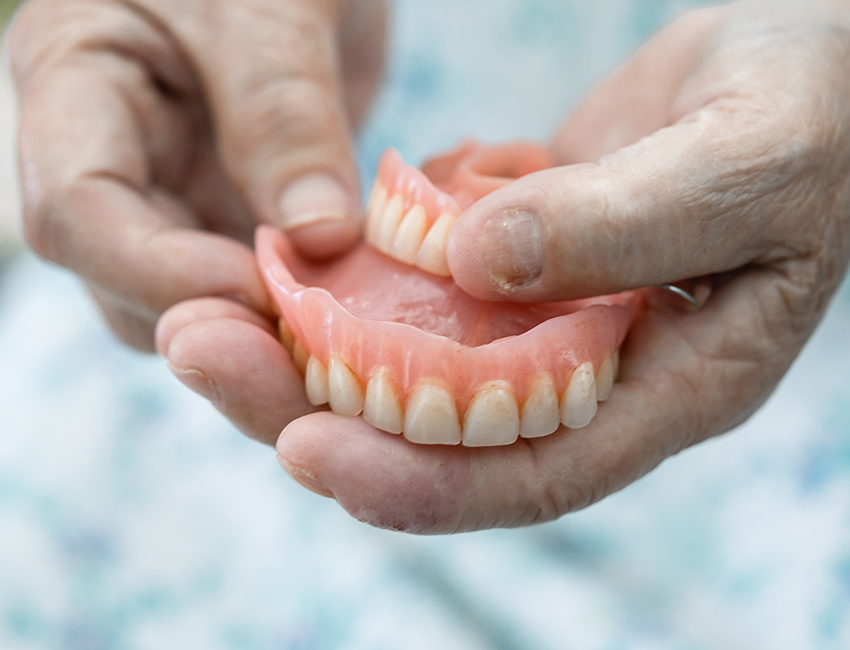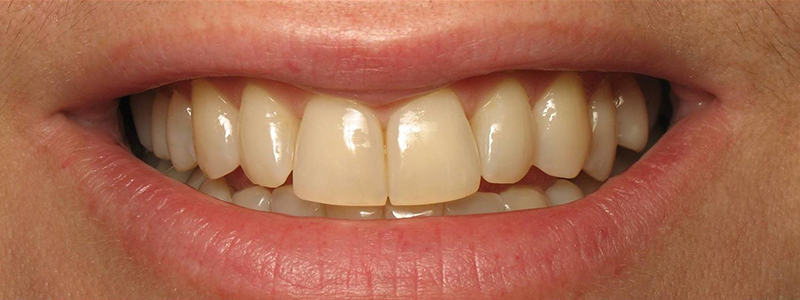DENTURES

A denture is a removable prosthesis that acts as a replacement for missing teeth and surrounding tissues holding the structures in place.
Two types of dentures are used depending on the case and number of missing teeth —
- Complete dentures
- Removable partial dentures.
Dentures can be taken out and put back into your mouth as and when needed and act as replacements for your teeth. With medical advancement, the dentures available today are very aesthetic and natural looking.
What are Complete Dentures?
Complete Denture will be your treatment of choice if you have all teeth missing or if teeth present are not healthy to withstand other treatment options. In case, any root pieces or damaged tooth are present in the mouth,they first need to be extracted and given time to heal completely.
After about 8-12 weeks post extraction and complete wound healing, the procedure of fitting dentures begins.
Immediate dentures are the type of dentures that can be placed immediately once the tooth is removed and is planned in advance before the extraction.
However,healing time can cause changes in bone structure which might need some adjustments to be done later in the fittings of immediate dentures. Immediate dentures can also act as a temporary solution till your custom ready complete denture is made.
What are Partial Dentures?
Partial dentures are removable dental replacement or extension with the substitute teeth attached to a resin base which is pink or gum colored. Sometimes a metal mesh or framework is connected to hold the dentures in position. Partial dentures are used when one or more teeth are missing in the jaw and are causing hindrance in function as well as smiling. In this type the teeth are replaced by a clasp attachment fixing the denture to adjacent teeth and filling in the spaces created by missing teeth.
1. How do Dentures Work?
A complete denture fits on the base and roof of the mouth with a pink gum colored resin material that acts as the framework for all the false teeth. We record custom impressions of mouth and teeth which is then finished in our lab to provide you best materials and comfort. Depending on your concern and condition of your teeth and gum, our specialist will recommend the best choice of denture.
2. How much time does it take to get used to Dentures?
Eating and speaking with newly made dentures can be taxing but we are here to make the entire process smooth and comfortable for you. Initially it is very natural to feel uncomfortable in your new dentures and it might feel heavy or bulky till you are adjusted to it. Our team will acquaint you with speech and movement exercises to teach you how to place your tongue in the correct position. If you are having difficulty in controlling your saliva, consult us for help.
3. How much time does it take to get used to Dentures?
Eating and speaking with newly made dentures can be taxing but we are here to make the entire process smooth and comfortable for you. Initially it is very natural to feel uncomfortable in your new dentures and it might feel heavy or bulky till you are adjusted to it. Our team will acquaint you with speech and movement exercises to teach you how to place your tongue in the correct position. If you are having difficulty in controlling your saliva, consult us for help.
4. How Long Do Dentures Last?
If taken good care of and with good hygiene practices, Dentures can last a good 5-10 years. You still need to visit your dentist for routine checkups to make sure there is no change in shape of your jaws. In such a case, new dentures are mandatory as they might cause unnecessary stress on your jaws.
5. Are There Alternatives to Dentures?
Dental implants are an alternative choice for missing teeth. An over denture using implants can ensure more stability and better function of dentures over regular dentures. Implants can act as support to the dentures and attached on top of the implant making it more sturdy.
6. What should one expect during the process of making my Dentures?
Dentures need 2 weeks to be designed and delivered and our dental specialist with complete the procedure in following steps:
Record impressions of your teeth and jaw and other soft structures around the teeth
Our Lab will then recreate wax and plaster models, wax forms, and/or plastic patterns in the right shape and position of the dentures recorded through impressions
Trying in a dummy denture to ensure proper color, shape, and fit before the final denture is cast in the final material.
Final denture is then made ready Tweaking and adjusting to make the denture more comfortable and easy to use.
7. Will Dentures change my appearance?
At Studio Dentale, we make sure to keep in mind the aesthetic and feel of natural looking teeth which is taken care of while making your dentures. Old photographs are used to match right shade of teeth in case of complete dentures. Dentures lift your face by contouring the muscles and holding them in place making you look younger.
8. Will Eating With New Dentures Be Difficult?
Any new foreign object needs some time to get used to and so is the case with dentures. Our team will guide you step by step adapting to normal diet beginning with small easy to eat food items and building it up gradually. Make sure you follow all instructions provided by your dentist and avoid eating sticky or hard food. As dentures can add a layer on your soft tissues, make sure to take care while consuming hot drinks.
9. Will my speech change due to wearing Dentures?
Speech therapy as a part of treatment will be provided by our specialists. With enough practice, you can quickly go back to speaking like usual with your dentures. If you face any clicking sounds while speaking, consult us immediately. Be extra cautious of your dentures while laughing, coughing or sneezing as they can slip and fall.
10. How many hours does one have to wear the dentures?
Our dentist will guide you about the duration of wearing dentures and when to remove them. Initially till you are accustomed to it, you may be asked to wear it all the time, including while you sleep. Once the tissues are adjusted, you can wear the dentures during the day and take them off in a clean case while sleeping.
11. Should I Use a Denture Adhesive?
Denture adhesives can help improve retention and make them more stable. In case you suffer from dry mouth, adhesives can be of great help.
Following care is recommended for denture wearers:
- Handle your denture with utmost care and avoid it from falling.
- Remove your denture after every meal, wash it with soap and water and then wear them again.
- Remove your dentures at night to give rest to gums.
- Massage your gums at night after removal of denture.
- Clean your dentures using soap water and a denture brush. Avoid toothpaste and tooth powder as they contain aggressive abrasives.
- Visit your dentist every 6 months for regular check ups.
“I am a foodie and will always be a foodie. ”
These were the first words uttered by this elderly patient at Studio Dentale. He said that being a foodie, he loves to eat various types of food. But now not having teeth was putting a damper on his food excursions.
Based on his overall health, we decided to give him Complete Denture. You can see the instant change in his smile upon receiving the complete denture.
During the follow up visits, he profusely thanked us for he was able to taste and chew his food properly.
The treatment charges depend on the type of denture you opt for and the one that is most suitable for you.
- ACRYLIC R.P.D (PER ARCH) = NPR 9500
- COMPLETE DENTURE (BOTH ARCH) = NPR 48,000
- CAST PARTIAL DENTURE: PER ARCH (MORE THAN 5 TEETH MISSING) = NPR 45,000
- C.P.D ADDITIONAL TOOTH = NPR 3500
- Overdenture : NPR 45000
- FLEXIBLE DENTURE: PER ARCH = NPR 25,000
.

BOOK AN APPOINTMENT






